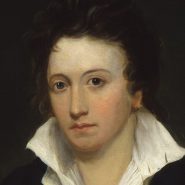By Robert Frost (1913)
The well was dry beside the door,
And so we went with pail and can
Across the fields behind the house
To seek the brook if still it ran;
Not loth to have excuse to go,
Because the autumn eve was fair
(Though chill), because the fields were ours,
And by the brook our woods were there.
We ran as if to meet the moon
That slowly dawned behind the trees,
The barren boughs without the leaves,
Without the birds, without the breeze.
But once within the wood, we paused
Like gnomes that hid us from the moon,
Ready to run to hiding new
With laughter when she found us soon.
Each laid on other a staying hand
To listen ere we dared to look,
And in the hush we joined to make
We heard, we knew we heard the brook.
A note as from a single place,
A slender tinkling fall that made
Now drops that floated on the pool
Like pearls, and now a silver blade.
Analysis
In “Going for Water,” an errand to fetch water becomes an adventure of imagination. The children leave the dry well near the house to find the brook in the moonlit woods, transforming necessity into play. Frost’s delicate rhymes and light iambic pulse imitate their quick steps and hushed laughter. The poem shimmers between realism and enchantment: the real brook is also a mythic source of renewal.
Frost captures childhood perception as freedom within boundaries. The “slender tinkling fall” they hear blends sensory detail with wonder, turning listening into discovery. What begins as domestic duty becomes ritual, a reminder that poetry itself often arises from the everyday task approached with attention. “Going for Water” is a small hymn to curiosity and the transforming power of delight.
